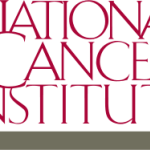- 産業: Government; Health care
- Number of terms: 6957
- Number of blossaries: 0
- Company Profile:
The National Cancer Institute (NCI) is part of the National Institutes of Health (NIH), which is one of 11 agencies that compose the Department of Health and Human Services (HHS). The NCI, established under the National Cancer Institute Act of 1937, is the Federal Government's principal agency for ...
An orally bioavailable small-molecule inhibitor of Janus kinases 1 and 2 (JAK1/2) with potential antineoplastic activity. JAK1/2 inhibitor CYT387 competes with JAK1/2 for ATP binding, which may result in inhibition of JAK1/2 activation, inhibition of the JAK-STAT signaling pathway, and so the induction of apoptosis and a reduction of tumor cell proliferation in JAK1/2-expressing tumor cells. JAK2 is the most common mutated gene in bcr-abl-negative myeloproliferative disorders; the JAK2V617F gain-of-function mutation involves a valine-to-phenylalanine modification at position 617. The JAK-STAT signaling pathway is a major mediator of cytokine activity and is often dysregulated in a variety of tumor cell types.
Industry:Pharmaceutical
An orally bioavailable small-molecule inhibitor of MEK1 and MEK2 (MEK1/2) with potential antineoplastic activity. MEK inhibitor AS703026 selectively binds to and inhibits the activity of MEK1/2, preventing the activation of MEK1/2-dependent effector proteins and transcription factors, which may result in the inhibition of growth factor-mediated cell signaling and tumor cell proliferation. MEK1/2 (MAP2K1/K2) are dual-specificity threonine/tyrosine kinases that play key roles in the activation of the RAS/RAF/MEK/ERK pathway and are often upregulated in a variety of tumor cell types.
Industry:Pharmaceutical
An orally bioavailable small-molecule inhibitor of MEK1 and MEK2 (MEK1/2) with potential antineoplastic activity. MEK inhibitor TAK-733 selectively binds to and inhibits the activity of MEK1/2, preventing the activation of MEK1/2-dependent effector proteins and transcription factors, which may result in the inhibition of growth factor-mediated cell signaling and tumor cell proliferation. MEK1/2 (MAP2K1/K2) are dual-specificity threonine/tyrosine kinases that play key roles in the activation of the RAS/RAF/MEK/ERK pathway and are often upregulated in a variety of tumor cell types.
Industry:Pharmaceutical
An orally bioavailable small-molecule inhibitor of mitogen-activated protein kinase kinase 1 (MAP2K1 or MEK1), with potential antineoplastic activity. MEK inhibitor GDC-0973 specifically binds to and inhibits the catalytic activity of MEK1, resulting in inhibition of extracellular signal-related kinase 2 (ERK2) phosphorylation and activation and decreased tumor cell proliferation. Preclinical studies have demonstrated that this agent is effective in inhibiting the growth of tumor cells bearing a B-RAF mutation, which has been found to be associated with many tumor types. A threonine-tyrosine kinase and a key component of the RAS/RAF/MEK/ERK signaling pathway that is frequently activated in human tumors, MEK1 is required for the transmission of growth-promoting signals from numerous receptor tyrosine kinases.
Industry:Pharmaceutical
An orally bioavailable small-molecule inhibitor of multiple tyrosine kinases with potential antineoplastic activity. Multitargeted tyrosine kinase inhibitor DCC-2036 binds to and inhibits the Bcr-Abl fusion oncoprotein by changing the conformation of the folded protein to disallow ligand-dependent and ligand-independent activation; in addition, this agent binds to and inhibits Src family kinases LYN, HCK and FGR and the receptor tyrosine kinases TIE-2 and VEGFR-2. Multitargeted tyrosine kinase inhibitor DCC-2036 may exhibit more potent activity against T315I Bcr-Abl gatekeeper mutant kinases than other Bcr-Abl kinase inhibitors. The TIE-2 and VEGFR-2 receptor tyrosine kinases regulate angiogenesis, respectively, while the Src family kinases Abl, LYN, and HCK Src regulate a variety of cellular responses including differentiation, division, adhesion, and the stress response.
Industry:Pharmaceutical
An orally bioavailable small-molecule inhibitor of p21-activated kinase 4 (PAK4) with potential antineoplastic activity. PAK4 inhibitor PF-03758309 binds to PAK4, inhibiting PAK4 activity and cancer cell growth. PAK4, a serine/threonine kinase belonging to the p21-activated kinase (PAK) family, is often upregulated in a variety of cancer cell types and plays an important role in cancer cell motility, proliferation, and survival.
Industry:Pharmaceutical
An orally bioavailable small-molecule inhibitor of p38 and Tie2 kinases with potential antineoplastic, anti-inflammatory and antiangiogenic activities. P38/Tie2 kinase inhibitor Arry-614 binds to and inhibits the activities of p38 and Tie2 kinases, which may inhibit the production of proinflammatory cytokines and may decrease tumor angiogenesis and tumor cell growth and survival. P38 is a MAP kinase that is often upregulated in cancer cells, playing a crucial part in the production of a variety of cytokines involved in inflammation and cellular proliferation such as tumor necrosis factor (TNF) and interleukin (IL)-1 and -6. Tie2 is an endothelial cell specific receptor that is activated by angiopoietins, growth factors required for angiogenesis. This agent has also been reported to inhibit other kinases including vascular endothelial growth factor receptor (VEGFR2) and Src tyrosine kinases.
Industry:Pharmaceutical
An orally bioavailable small-molecule inhibitor of the Hedgehog (Hh) signaling pathway with potential antineoplastic activity. Hedgehog inhibitor PF-04449913 appears to inhibit Hh pathway signaling. The Hh signaling pathway plays an important role in cellular growth, differentiation and repair. Constitutive activation of Hh pathway signaling has been observed in various types of malignancies.
Industry:Pharmaceutical
An orally bioavailable small-molecule inhibitor of tryptophan hydroxylase (TPH) with potential antiserotonergic activity. TPH inhibitor LX1032 binds to and blocks the activity of TPH, which may result in a reduction in peripheral serotonin (5-HT) production and improvement of serotonin-mediated gastrointestinal effects such as severe diarrhea. This agent does not cross the blood-brain barrier (BBB), thus CNS serotonin levels are unaffected. TPH, the rate-limiting enzyme in serotonin biosynthesis, is overexpressed in carcinoid tumor cells.
Industry:Pharmaceutical
An orally bioavailable small-molecule receptor tyrosine kinase (RTK) inhibitor with potential antineoplastic activity. XL647 binds to and inhibits several tyrosine receptor kinases that play major roles in tumor cell proliferation and tumor vascularization, including epidermal growth factor receptor (EGFR; ERBB1), epidermal growth factor receptor 2 (HER2; ERBB2), vascular endothelial growth factor receptor (VEGFR), and ephrin B4 (EphB4). This may result in the inhibition of tumor growth and angiogenesis, and tumor regression.
Industry:Pharmaceutical
